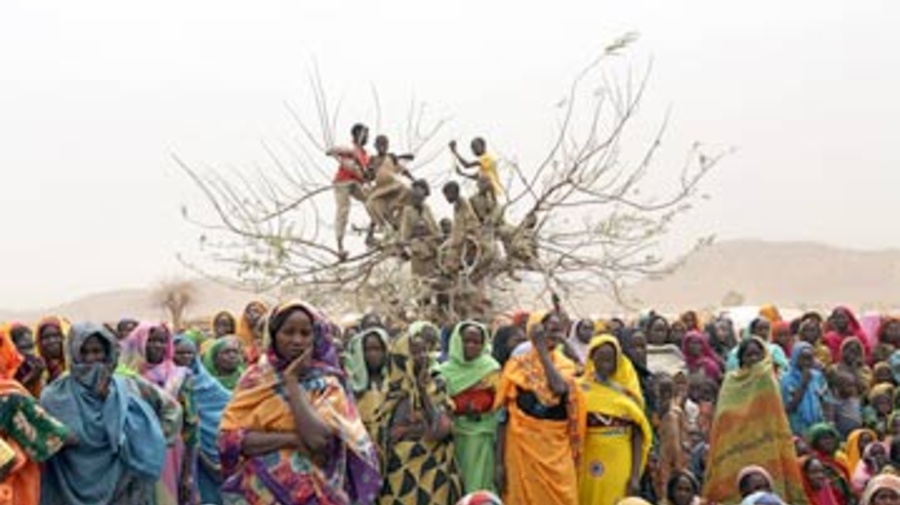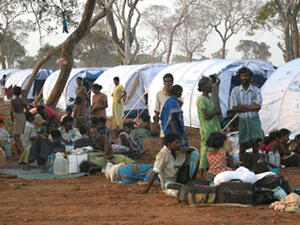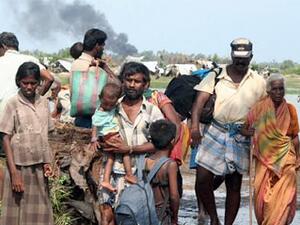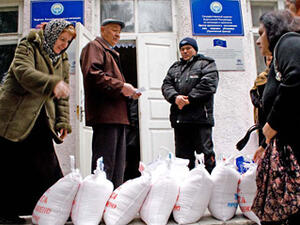UNHCR concerned about janjaweed militia attacks in eastern Chad
UNHCR concerned about janjaweed militia attacks in eastern Chad

Displaced women in the eastern Chad village of Gouroukoun. UNHCR fears janjaweed militia attacks will leave more Chadians homeless in the east of their country and threaten the security of border camps holding Sudanese refugees from Darfur.
GOZ BEIDA, eastern Chad, June 6 (UNHCR) - UNHCR is extremely concerned about continuing attacks by janjaweed militia in eastern Chad and the potential for more internal displacement of local Chadians. The continuing insecurity also poses a threat to 213,000 Sudanese refugees from Darfur in a dozen UNHCR-administered camps in this remote region along the border with Sudan.
On Saturday, armed militiamen stole 350 head of cattle from a village 20 km west of Koukou Angarana, in the Goz Beida region of eastern Chad. No casualties were reported, but this is just one recent example of escalating violence which is causing increasing displacement and sometimes death.
The janjaweed attacks against Chadians appear to have become more systematic and deadly over the past three months and there is no sign that this pattern will stop. UNHCR on Tuesday reiterated a call for action aimed at ending the violence.
"We urge authorities in Chad and Sudan to reinforce security in border regions to prevent further attacks and displacement, and call for more international engagement in dealing with the very serious issue of spreading instability and insecurity," UNHCR chief spokesman Ron Redmond told journalists in Geneva.
There are presently an estimated 50,000 displaced persons in eastern Chad who have fled their homes in recent months following dozens of attacks by the janjaweed militia. In some cases, people flee out of fear of impending attacks, and many have been displaced several times.
"We need resources to help the displaced in Chad," said UNHCR's representative in Chad, Ana Liria-Franch, who also called for greater international commitment. She said UNHCR was trying to provide basic assistance and protection to the displaced, adding that many had lost everything.
A major attack near Modeyna on March 3-4 led to the displacement of thousands of villagers to Koloye, 15 km away. Dozens of local inhabitants were reportedly killed during that attack. Militia later attacked Koloye and the displaced from Modeyna once again had to flee, this time to Gouroukoun, near Goz Beida.
On April 13, hundreds of janjaweed attacked the village of Djawara, massacring more than 100 men and stealing hundreds of cattle. Djawara, 60 km from the Sudan border, and other surrounding villages are now deserted. Most of the inhabitants fled north-east to Dogdore to join others recently displaced. Dogdore now hosts an estimated 9,000 displaced Chadians.
UNHCR teams have interviewed many displaced persons in spontaneous settlements. They say attacks are being perpetrated by janjaweed militia coming from Sudan. "They were wearing khaki military Sudanese clothing," claimed one man, referring to the assailants at Djawara.
The displaced also say that on several occasions they recognised Chadians from other tribes taking part in attacks together with the Sudanese janjaweed militia, alleging that those Chadians had concluded agreements with the militia to avoid attacks on their own properties and livestock.
On May 1, a group of 150 janjaweed attacked cattle herders near Koukou, stealing 2,000 head of cattle and killing five people. Repeated attacks early April at the border, especially on the village of Singitao, caused more displacement. UN agencies and non-governmental organisations were able to relocate some 1,300 displaced persons to the village of Habile near Koukou.
The arrival of more displaced persons in Chadian villages and towns often strains already limited resources, including water. Goz Beida, with 6,000 locals, hosts 14,000 Sudanese refugees in Djabal camp and is now trying to cope with an additional 11,000 displaced Chadians in nearby Gouroukoun village.
UNHCR has relocated 2,000 people from Gouroukoun to other villages in a bid to ease the strain on water supplies, but it was not easy. "These people had already been displaced several times in the past few months because of janjaweed attacks and, understandably, it was hard for them to think of moving again," said Bernard Lambrette, UNHCR coordinator for internally displaced persons (IDPs) in eastern Chad. "We did several sensitization campaigns in Gouroukoun with women and tribal leaders, and also organised visits to the relocation villages in order to show them the benefits of moving."
These relocations are part of an inter-agency 'cluster approach' toward IDP issues in eastern Chad. UNHCR is responsible for protection and shelter; UNICEF for health and water; and WFP for food security. A few non-governmental organizations are also involved.
In all, there are 213,000 Sudanese refugees in eastern Chad as well as 50,000 IDPs. There are also 47,000 refugees from the Central African Republic in southern Chad.
By Hélène Caux in Goz Beida and Djawara, Eastern Chad









